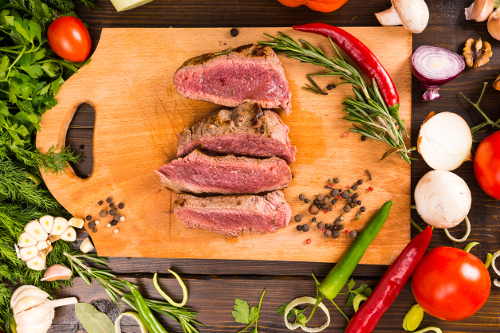 What if I told you that I’ve eaten a steak, burger, or some form of red meat for about half the year, every year for the last five years of my life? Some days, I’ll eat up to three eggs, which are also high in saturated fat. You’d probably say I’m going to have a heart attack at some point, right?
What if I told you that I’ve eaten a steak, burger, or some form of red meat for about half the year, every year for the last five years of my life? Some days, I’ll eat up to three eggs, which are also high in saturated fat. You’d probably say I’m going to have a heart attack at some point, right?
Well, what if I also told you that my blood pressure is consistently 117/75 when my doctor checks it? Now, you’d certainly call me a liar! But guess what? It’s all true. And the latest research may explain why.
Is Cutting Saturated Fat from Your Diet Necessary?
In a new editorial published online in the British Journal of Sports Medicine, a group of cardiologists came to the consensus that saturated fat is not a major risk factor for heart disease. And that cutting it from your diet does not decrease the chance of heart attack, Type 2 diabetes, or death for people at risk. This flies in the face of much of the advice that you’ve been hearing for years—and advice that may have seen you pay the price.
It’s quite possible that you—like so many other Americans and people around the world—made decisions to cut foods like red meat, eggs, and butter from your diet (items that are nutritionally valuable, by the way). These items were likely replaced by low-fat, high-carb options to replicate the flavors you’d craved. But, research over the past decade or so has indicated that diets high in processed and refined carbohydrates have been massive contributors to heart disease, diabetes, and premature death.
Insulin, Heart Disease, and Diabetes
The short of it has to do with insulin resistance. Eating a lot of pasta, white bread, and white potatoes, for example, sends a big blast of sugar into the bloodstream. Once it’s in there, it’s called blood glucose, and is transported to your cells by a hormone called insulin. Blood glucose gives your cells energy to function. But, when you’re eating too much of this stuff, your body produces too much insulin, and it becomes ineffective. This can lead to an inflammatory attack on blood vessel walls and the hardening of arteries over time. And, based on the latest news, it doesn’t appear to change in the presence of saturated fat.
Now, I’m not saying that you should run to the grocery store and buy a stick of butter to snack on. What I am saying is that including butter, red meat, or other items with saturated fats in your otherwise healthy diet probably won’t increase your risk for heart disease. Instead of focusing on keeping one item out of your diet for health, it’s better to focus on the total picture.
The Best Defense Is a Balanced, Healthy Diet
The best diet to reduce the risk of early mortality, Type 2 diabetes, and heart disease is the Mediterranean diet—which basically means fresh, natural foods from a variety of sources. Include plenty of vegetables, nuts, beans, fish, and even some red meat from time to time if you like.
A balanced diet, along with 20 to 30 minutes of exercise and stress reduction techniques, will do far more for you than worrying about the health impacts of saturated fats. So this weekend, if there’s a lean steak and a little butter on the table, don’t be afraid to dig in!
Related Articles:
Snubbing Saturated Fats May Not Protect You From Heart Disease
Saturated Fat Health Risks Worsened from Immune Response
Not All Saturated Fat May Be Bad For You, Study Says
Sources
Malholtra, A., “Saturated fat does not clog the arteries: coronary heart disease is a chronic inflammatory condition, the risk of which can be effectively reduced from healthy lifestyle interventions,” British Journal of Sports Medicine, http://dx.doi.org/10.1136/bjsports-2016-097285, last accessed April 26, 2017.
“Pass the butter: Cutting saturated fat does not reduce heart disease risk, cardiologists say,” CBC News, April 25, 2017; http://www.cbc.ca/news/health/pass-the-butter-cutting-saturated-fat-does-not-reduce-heart-disease-risk-cardiologists-say-1.4085453, last accessed April 26, 2017.
